November 27, 2025 | 19:57 GMT +7
November 27, 2025 | 19:57 GMT +7
Hotline: 0913.378.918
November 27, 2025 | 19:57 GMT +7
Hotline: 0913.378.918
Within the framework of the seminar "Circular Agriculture - Green Farms - Clean Products," a large number of leading experts, scientists, businesses, and farmers were gathered to discuss circular agriculture models and share practical experiences in building green farms and producing clean products.
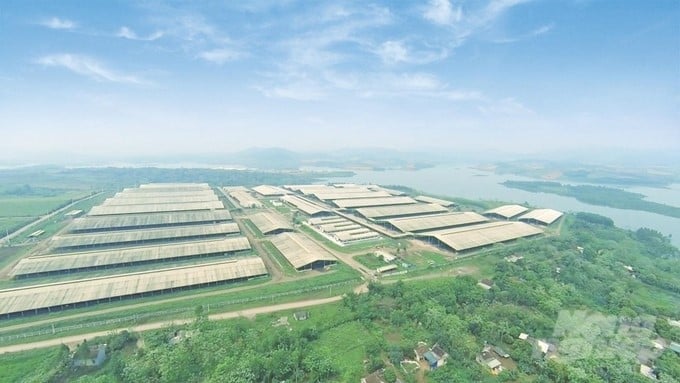
Building green farms and producing clean products is of concern to the entire society. Photo: MS.
According to the Vietnam Council of Agricultural Companies (VCAC), circular agriculture is an advanced agricultural production model that imitates natural ecosystems where resources are used effectively and maximally, reducing waste and greenhouse gas emissions. This model is increasingly being concerned with and applied in Vietnam, promising to bring many benefits to the environment, society, and economy.
Mr. Ha Van Thang, Chairman of VCAC, shared: "Circular agriculture is an inevitable trend and plays an extremely important role. We appreciate green and clean products that not only bring health to domestic consumers but are also aimed at export."
According to Mr. Thang, green agriculture is aiming to improve the competitiveness of agricultural products and develop technology to process and reuse by-products and waste, not only improving value but also improving the environment, helping farmers have a better quality of life, and protecting resources and agricultural ecosystems. Thereby ensuring sustainable agriculture and contributing to green economic development.
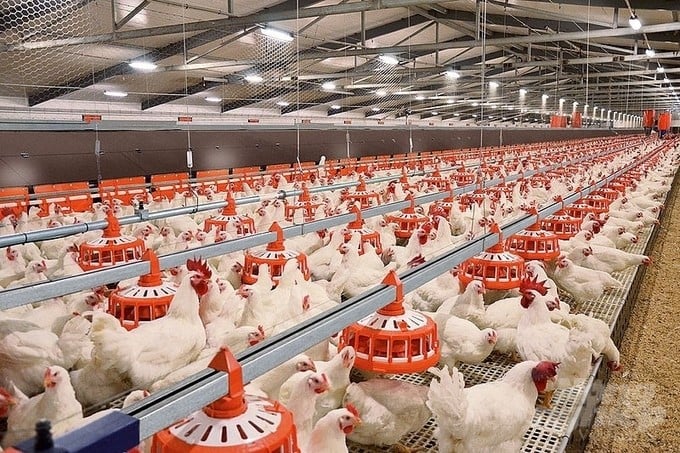
Experts said that the issue of "animal welfare, sustainable livestock farming development, and export" needs to be associated with biosafety and reducing antibiotics in livestock farming as solutions for livestock products to qualify for export to many markets. Photo: MS.
At the seminar, experts also discussed the issue of "animal welfare, sustainable livestock farming development, and export."
According to the Vietnam Farms and Agricultural Enterprises Association (VFAEA), animal welfare is simply understood as treating animals well so that they are in the best physical and mental state, avoiding unnecessary pain.
Consumers are also paying great attention to the food from livestock and how they live in barn conditions. This is also a future trend that consumers are very interested in and aim for transparency.
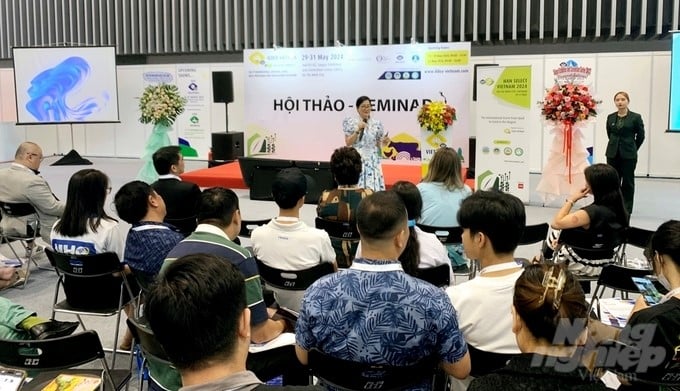
According to Dr. Ha Thuy Hanh, consumers are also paying great attention to the food from livestock and how they live in barn conditions. Photo: Minh Sang.
Dr. Ha Thuy Hanh, Vice President of VFAEA, affirmed: "In Vietnam, animal welfare is still a new concept, and not all farmers understand it. However, animal welfare is an extremely important factor in developing a sustainable livestock industry."
To keep products from cattle and poultry free of antibiotic residues and growth substances, livestock (hens and sows) should be freed from cages to live in a free environment according to their behavior. When livestock are not stressed, they will produce more productive and better-quality meat and eggs.
The entire country currently has a total chicken flock of about 550 million heads, but the proportion of chicken farming that ensures animal welfare is still very small. Dr. Hanh cited real evidence that in Vietnam, chickens are often kept in cages with many floors. Meanwhile, egg-laying chickens are often kept in cages at high density without laying nests, lack exercise and playgrounds, are not allowed to express instinctive animal behavior, and lack perches, sand digging, etc. But, these are the standards that help the chicken express its most natural instincts and keep it healthy.
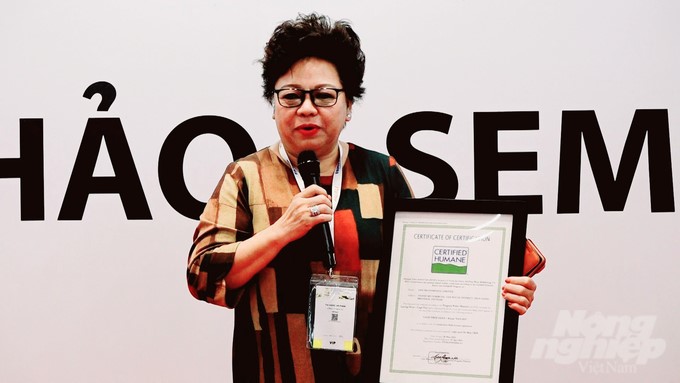
Ms. Pham Thi Ngoc Ha, General Director of San Ha Co., Ltd., excitedly shared at the seminar about San Ha's journey in accompanying the agricultural sector with the wish to have quality products to serve consumers. Photo: Minh Sang.
Similarly, with industrial pregnant and nursing sows raised in metal cages, they lack movement and conditions to express natural instincts such as rubbing their snouts, moving, standing, interacting, etc.
The entire country now has about 3.2 million sows used to provide breeds for Vietnam's pork industry. The rate of cage farming is still common, and there are currently no pig farms certified for animal welfare.
Animal welfare, in addition to biosafety, also brings product value and brand value to businesses. San Ha is a pioneering business in the field of food production in Vietnam, actively promoting the application of circular agriculture models and improving animal welfare in Vietnam.
Ms. Pham Thi Ngoc Ha, General Director of San Ha Co., Ltd., excitedly shared: "We have just been awarded a farm animal welfare certificate, Humane Farm Animal Care (HFAC). However, I think this is just the beginning of our business's long journey for the circular agriculture sector, green farms, and clean products in the coming time."
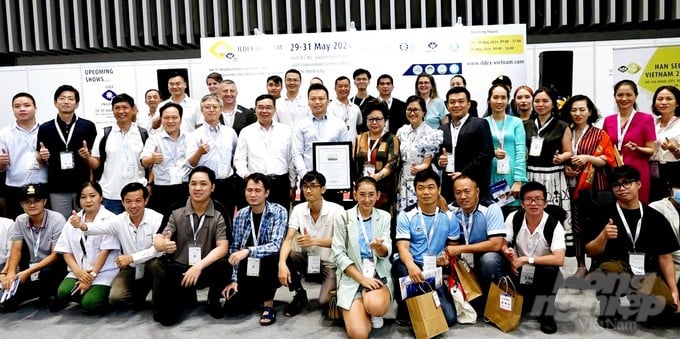
Domestic and international business delegates congratulated San Ha Company on being awarded the farm animal welfare certificate, Humane Farm Animal Care (HFAC), and took souvenir photos at the seminar. Photo: Minh Sang.
According to Ms. Ha, Vietnamese agricultural businesses need to improve product quality, aiming for clean, safe, and valuable products to supply to the market and bring health to Vietnamese consumers.
"VFAEA has cooperated with Humane Society International (HSI), the world's leading animal protection organization, and San Ha Company, a pioneering business in the field of food production in Vietnam, to promote sustainable and ethical agricultural practices in Vietnam by combining the expertise and resources of three organizations. This cooperation wishes to bring the necessary knowledge and connections to implement circular agriculture models, improve animal welfare, and create a safer and more sustainable food supply for consumers," said Dr. Ha Thuy Hanh.
Translated by Thu Huyen

(VAN) According to Mr. Vo Minh Thanh, Director of the Tay Ninh Department of Agriculture and Environment, Resolution 57 has created a new development pathway for the locality, shifting from traditional toward modern agriculture.
/2025/11/26/4909-2-154329_878.jpg)
(VAN) Pearl grouper farming in HDPE cages not only delivers economic efficiency but also contributes to protecting the environment, creating jobs, and promoting marine-based experiential tourism.

(VAN) The model of making a living under the forest canopy through the agroforestry system in Van Son commune, Bac Ninh province, is expected to generate an annual income of approximately VND 30 million/ha.

(VAN) Many enterprises in Can Tho are harnessing natural energy and reducing greenhouse gas emissions in their production processes, thereby contributing to the promotion of a sustainable green transition.
/2025/11/24/3536-2-112800_176.jpg)
(VAN) Dong Nai now has tens of thousands of hectares of forests certified for sustainable management, and this area will continue to be expanded in the coming period.

(VAN) Vinh Ha hamlet (Dai Xuyen commune, Hanoi) is shifting away from small-scale farming as households adopt bioscurity into their breeder chicken models.

(VAN) Heavy rains make aquatic species more vulnerable to disease. Proactive water management and high-tech systems help farmers prevent outbreaks and protect yields.